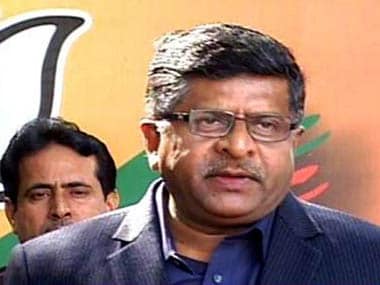Ravi Shankar Prasad's digital nationalism sends out mixed messages, may inhibit glorious technology revolution


Information Technology Minister Ravi Shankar Prasad has been more than active over the past few weeks, saying things on the digital economy that have raised eyebrows, if not hackles. He is right in saying that social media companies will not be allowed to abuse the Indian electoral process, or in calling for some kind of regulation to check rumours and fake news on Facebook-owned WhatsApp.
However, in the context of a free market economy and freedom of expression, some statements are bound to be examined closely, if not altogether misconstrued. His intentions may be noble, but his words are far from clear.
Prasad's latest statement, made in a grandiose way in Argentina at a G20 meeting that internet giants should reinvest their profits in India to create jobs, is bound to be seen in a suspicious light for more reasons than one.
The digital economy by its very DNA has a global character. Facebook, Amazon, Apple, Netflix and Google, collectively called FAANG, are revolutionising the world economy by offering a range of services across the planet, dramatically improving efficiencies and being rewarded by the stock market in the process.
The catch, however, is that cloud computing is at the heart and soul of their business models, tying everybody from home office hacks to giant corporations in one big technological embrace.
In such a context, a call to create jobs through reinvestment smacks of a philosophy that may be in tune with the increasingly protectionist tendencies everywhere from the US to Eastern Europe and China, but there is reason to believe that unless carefully measured and articulated, this may stop the Fourth Industrial Revolution in its tracks even as the Third Industrial Revolution powered by digital technologies only just takes off in India.
The fourth revolution, as the World Economic Forum says, is "characterised by a fusion of technologies that is blurring the lines between the physical, digital, and biological spheres". What exactly does Prasad want? Unless he articulates his thoughts clearly, we have to point out that internet giants already have spun hundreds of thousands of jobs in India.
Google in four Indian cities and Amazon in five are counted among the top tech places to work in India. Their engineers are shaping new technologies and business processes in which "Serviced from India" or "Designed in India" is already a much bigger success than the intention of a "Make in India" manufacturing programme.
Facebook has a facility in Hyderabad that may not be as big as the other two giants, but between the three of them, they have "ecosystem" partners including advertising agencies, search engine experts, content creators, e-commerce players and sundry service providers that together account for a huge workforce.
Faced with new challenges of content moderation as well as regulation, Facebook is hiring away and India is definitely a key zone to recruit more. India's thriving start-up scene, which is ranked third in the world, saw its Startup India programme count 8,000 firms as of last March. Prasad says it is "only fair and just" that giants invest their profits back into its largest markets. If we take a nuanced view, it would seem the minister is looking at some kind of a fiscal policing of the consumer side of the Internet giants — such as e-commerce operations that benefit from local customers.
In the backdrop of an attempt to regulate e-commerce in India, does that mean some kind of a carrot-and-stick method to help local companies? The definition of a local company is itself as "complicated" as some Facebook relationship statuses. Global venture capital funds are nurturing homegrown entrepreneurs in India and creating "unicorns" (billion-dollar valuation startups). Further, news is just out that legendary investor Warren Buffett is planning to pick up a stake in One97, the parent of Paytm.
The NDA government's proposed e-commerce policy draft wants regulations on everything from discounts and competition to foreign direct investment where online marketplaces sell their own manufactured goods. Amazon and Walmart-controlled Flipkart understandably want the whole draft junked.
Two years ago, India introduced a six percent equalisation levy popularly known as "Google Tax" to milk a portion of the advertising revenue gains internet giants get from their ecosystem. Now there is speculation that this may be extended even to non-digital multinationals. In such a context, the minister has a lot of talking to do to explain his case on internet investments into India.
Global capital loves India's potent mix of engineers, entrepreneurs and service providers in a billion-plus-people market formng the world's fastest growing economy. Does Prasad want to introduce a quasi-Nehruvian policy of inward-looking regulations that undo the philosophy of globalisation pursued since 1991? For the avowedly anti-Nehruvian BJP, that would be a counter-intuitive thought. As a major gainer from technological globalisation and free capital flows over the past three decades, India must know the limits of digital nationalism.
Comments
Post a Comment